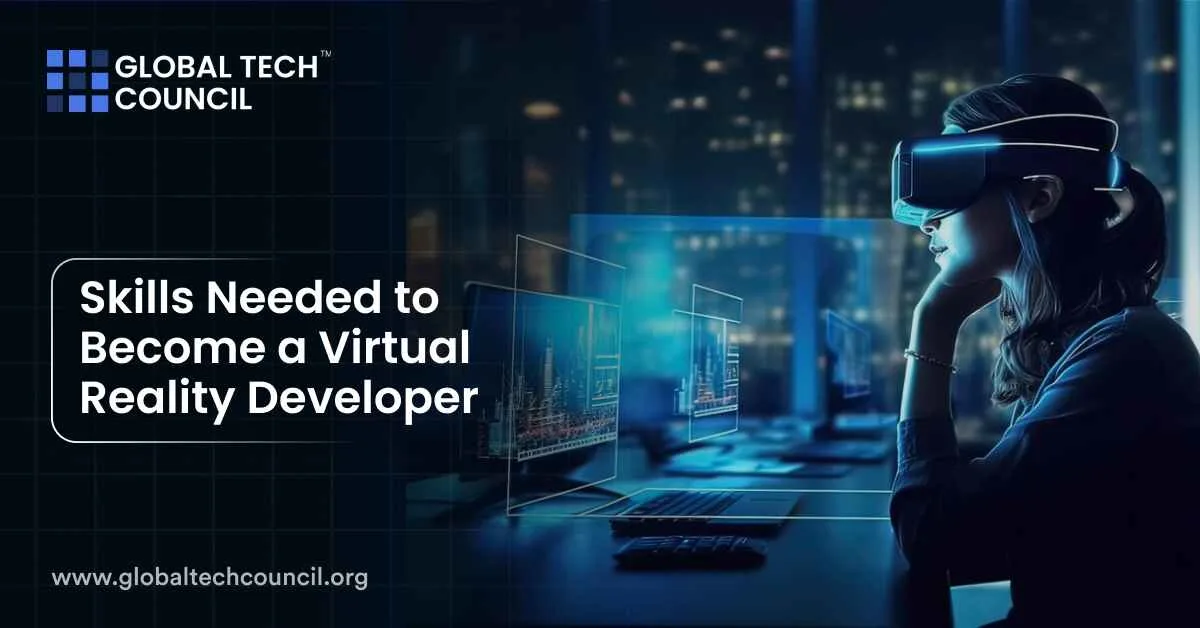
To become a good virtual reality developer, just being able to create 3D environments will not suffice. Entrepreneurs and businesses looking to hire virtual reality developers will look for a combination of skills such as software programming, 3D design skills, game development, video or sound production skills, and UI/UX. There might be a slight or moderate variation in these depending on what the employer is looking for. In this article, I will educate you on the prominent skills you will need to make your resume stand out and be a great virtual reality developer.
What is Virtual Reality?
Virtual Reality (VR) refers to using computer technology to create a simulated environment. Unlike traditional user interfaces, the user is placed inside experiences in the case of VR. The users, instead of viewing the screen in front of them, are immersed and are able to interact with 3D environments. Virtual reality helps stimulate senses such as smell, vision, touch, and hearing. In virtual reality, the computer uses sensors and math. Rather than locating a real camera within a physical environment, the user’s eyes are positioned within the simulated environment. The graphics react according to the head movements of the user. VR technology creates an interactive and convincing world for the user, rather than compositing a real scene and virtual objects.
General Skills Needed For a Virtual Reality Developer
Some of the general skills a virtual reality developer must have are:
-
Video editing.
-
3D Modelling.
-
Experience in CAD (computer-aided design), VR operation tools, and DSLR 2D images and videos.
-
Proficiency in creating VR content with the available resources.
-
Exposure to digitalization trends.
-
Knowledge of various device specifications and hardware.
-
Experience in operating wearables such as HTC VIVE, Oculus, and HoloLens.
What Does a Virtual Reality Developer Do?
Virtual reality developers are those who code multifaceted, immersive VR apps and games that can run on the web and various native platforms. In short, they create simulated worlds, and a lot of effort goes into making them look realistic. Just like every VR app being different, VR developers are also not created equal. Some may be newbies who use user-friendly platforms to create simpler prototypes which some may be highly-skilled programmers who can custom-code apps from the ground up. There are many virtual reality developers who focus on the non-linear, complex world of VR gaming and will have the other artistic prowesses and skills that support them in bringing storylines to life with sound, music, characters, and animation skills like 3D rigging.
Some of the major platforms they develop for are:
- Oculus Rift.
- iOS.
- HTC Vive.
- Gear VR.
- PS4.
The tools used by virtual reality developers include 3D programming engines such as:
-
Web VR, which is an experimental JavaScript-powered API.
-
OpenGL.
- Cryengine.
-
A-Frame and Vizor web frameworks.
-
Unreal Engine- This uses the C++ programming language and Blueprints OOP visual scripting language.
-
Unity 3D that uses PlayMaker and C# visual scripting language.
-
Google VR SDK.
Skills Needed For a Virtual Reality Developer
Some of the skills you will require to become a successful virtual reality developer are:
1. 3D Tools
Many of the earliest VR developers were from the game industry because of their knowledge of 3D tools like Unreal and Unity. While unreal is used by some virtual reality developers, Unity seems to be the tool of choice for a majority of VR developers. A virtual reality developer must have an understanding of textures, scripts, objects, components, and other Unity basics that will go a long way in developing virtual reality models.
2. Software Engineering
For many years now, knowledge in C# has been a prerequisite for VR development. Though knowledge and experience in C# will be advantageous, with the rise of UnityScript and WebVR, mastering JavaScript can be a sufficient and useful replacement. You are all set in software engineering if you have knowledge in either of the two or both.
3. Sound Design
One of the first lessons you will be thought as a web developer is not to include any audio features. Right from the 2000s and until this day, auto-playing audio and video exist on sites and continue to irritate users. But integrating sound in VR experiences is very crucial to create immersive experiences. Game developers will find it very easy to integrate audio into their projects. But web developers will have many things to learn about sound design. Aspects of sound design, such as background music, audio location, audio effects, and many other topics must be learnt to provide users with a memorable VR experience.
4. UI/UX
You would have noticed that when you surf the web that there are many pages that vary in design. But every website you come across follows common practices with shared icon meaning, user behavior patterns, hyperlinks, and much more. Though that standard does not exist in VR today, you would want to stay updated with the current trends and UX practices.
Conclusion
I hope you have now gained an idea about the skills a virtual reality developer should have. To become a virtual reality expert and know more about virtual reality certifications, you can check out Global Tech Council.